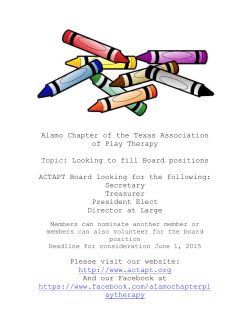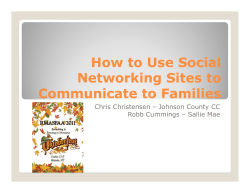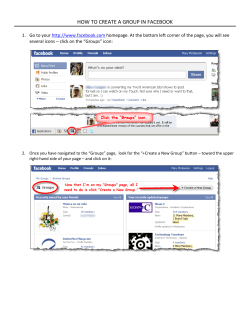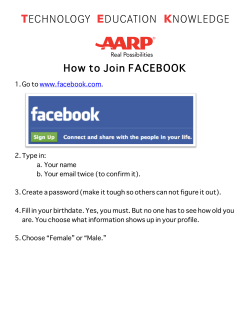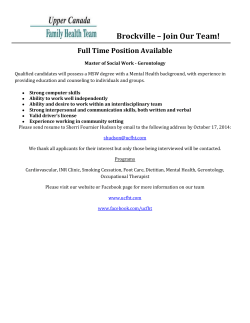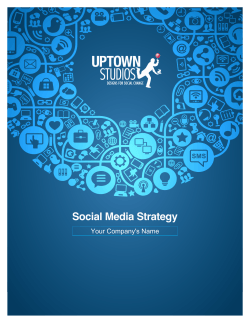
File - the Library Media Center!
AP® ENGLISH LANGUAGE AND COMPOSITION FREE-RESPONSE QUESTIONS ENGLISH LANGUAGE AND COMPOSITION SECTION II Total time—2 hours Question 1 (Suggested time—40 minutes. This question counts for one-third of the total essay section score.) In the last few years, the use of “social media” by teenagers has become a controversial issue. Because social media platforms are so far-reaching and unavoidable, many adults and teenagers have come to question the value and effects of social media – especially in regard to teenagers. Some people argue that social media platforms provide valuable tools for communication and selfexpression. Others, however, believe that teenagers’ use of social media is ultimately destructive and dangerous. Carefully read the following six sources, including the introductory information for each source. Then synthesize information from at least three of the sources and incorporate it into a coherent, well-developed essay that evaluates whether social media positively or negatively affects the lives of teenagers. Your argument should be the focus of your essay. Use the sources to develop your argument and explain the reasoning for it. Avoid merely summarizing the sources. Indicate clearly which sources you are drawing from, whether through direct quotation, paraphrase, or summary. You may cite the sources as Source A, Source B, etc., or by using the descriptions in parentheses. Source A (Stewart) Source B (Watts) Source C (O'keeffe) Source D (Social Media Poll) Source E (Inskeep) Source F (Scott) © The College Board. All rights reserved. Visit the College Board on the Web: www.collegeboard.com. GO ON TO THE NEXT PAGE. -1- AP® ENGLISH LANGUAGE AND COMPOSITION FREE-RESPONSE QUESTIONS Source A Stewart, Rebecca Felsenthal. "Social Media: What Parents Must Know." WebMD. WebMD, 19 Dec. 2012. Web. The following is from an article published on the website “WebMD” in 2012. Whether or not you're tweeting or sharing your daily thoughts on Facebook, you have to acknowledge it: Interacting with friends online is a fact of life for your children. "These connections are really integral to the social lives of today's kids," says Caroline Knorr, parenting editor for Common Sense Media, a nonprofit organization that helps families navigate the world of media and technology. Besides the benefits, there are also risks. That's where you come in. "It's a parent's responsibility to parent around the technology", says Shawn Marie Edgington, author of The Parent's Guide to Texting, Facebook and Social Media. Once your child is of age and has your permission, sit down together to set up the account. Use all the privacy restrictions available and don't give unnecessary information like cell phone numbers, Knorr says. This is also a good time to talk about what not to post, such as your home address, your child's location, and any inappropriate pictures (including those that have "geotagging" that gives away the child's location). Instruct her never to "friend" anyone she doesn't know, and never to share her password, Edgington says. Tell her that she can come to you if anything happens online that makes her uncomfortable. Write a contract for your child about how they behave on social media. Outline consequences: "If you take away a 16-year-old's cell phone, it's worse than taking away his car," Edgington says. Remind your child that social rules apply online, Knorr says. Explain that it comes down to how she wants to portray herself to the world, and that once something is online, it's hard to make it go away. "Everything your child posts is about his image and brand because it's going to be there forever," Edgington says. Colleges and employers check social networking sites and do Google searches on applicants. Social media can take up a lot of time and energy. If your child starts to stress about how many times her photos or posts are liked or retweeted, it's time to step in. "You want to raise a kid who feels she has internal self-worth" beyond that, Knorr says. There are times when texting and checking Facebook is just not appropriate, such as during family dinners, catching up with relatives in person, at or after bedtime, and during class. Of course, texting or being online while driving is totally off limits, for safety's sake. Watch your own behavior, too. "Start with your own usage as a parent," Knorr says. "Say, ‘I'm putting the phone away at dinner time because that's how we do it in our family. When we meet someone we have to make eye contact.' It's important for kids to learn how to socialize properly and be in the world without the stimulation of the online environment." © The College Board. All rights reserved. Visit the College Board on the Web: www.collegeboard.com. GO ON TO THE NEXT PAGE. -2- Source B Watts, Andrew. "A Teenager's View on Social Media." Medium. N.p., 03 Jan. 2015. Web. The following is an excerpt from an article published on the website “Medium” in 2015. I read technology articles quite often and see plenty of authors attempt to dissect or describe the teenage audience, especially in regards to social media. However, I have yet to see a teenager contribute their voice to this discussion. This is where I would like to provide my own humble opinion. I think the best way to approach this would be to break it down by social media network and the observations/viewpoints I've gathered over the years. In short, many have nailed this on the head. [Facebook is] dead to us. Facebook is something we all got in middle school because it was cool but now is seen as an awkward family dinner party we can't really leave. It’s weird and can even be annoying to have Facebook at times. That being said, if you don't have Facebook, that’s even more weird and annoying. Weird because of the social pressure behind the question, “Everyone has Facebook, why don't you?” and annoying because you'll have to answer that to just about everyone in classes you meet who makes an attempt to friend you or find you on there. Instagram is by far the most used social media outlet for my age group. Please note the verbiage there— it is the most used social media outlet. Meaning, although the most people are on Facebook, we actually post stuff on Instagram. Everything about [Instagram] makes it less commercialized and more focused on the content, meaning more teens are inclined to visit it. When we do visit the application it is a much more pleasant experience so we are more inclined to Like and interact with the posts more. This increases our interaction with the application, meaning we will use it more, etc. To be honest, a lot of us simply do not understand the point of Twitter… Twitter is a place to follow/be followed by a bunch of random strangers, yet still have your identity be attached to it. Your tweets are also easily searchable on Twitter which is good but not good if you want to be yourself and not have it follow you around when you're trying to land a job. Thus, to others Twitter is used like Facebook—you post with the assumption that your employer will see it one day. Snapchat is where we can really be ourselves while being attached to our social identity. Without the constant social pressure of a follower count or Facebook friends, I am not constantly having these random people shoved in front of me. Instead, Snapchat is a somewhat intimate network of friends who I don't care if they see me at a party having fun. Snapchat has a lot less social pressure attached to it compared to every other popular social media network out there. This is what makes it so addicting and liberating. [Snapchat] really focuses on creating the Story of a day in your life, not some filtered/altered/handpicked highlight. It’s the real you. Remember in the section on Twitter I said, “Twitter is also a place to follow/be followed by a bunch of random strangers, yet still have your identity be attached to it”? Tumblr is a place to follow/be followed by a bunch of random strangers, yet not have your identity be attached to it. Tumblr is like a secret society that everyone is in, but no one talks about. Tumblr is where you are your true self and surround yourself (through who you follow) with people who have similar interests. It’s often seen as a “judgment-free zone” where, due to the lack of identity on the site, you can really be who you want to be. The only Tumblr URLs I know of people in real life are my close friends and vice versa. © The College Board. All rights reserved. Visit the College Board on the Web: www.collegeboard.com. GO ON TO THE NEXT PAGE. -3- AP® ENGLISH LANGUAGE AND COMPOSITION FREE-RESPONSE QUESTIONS Source C O'keeffe, G. S., and K. Clarke-Pearson. "The Impact of Social Media on Children, Adolescents, and Families." Pediatrics 127.4 (2011): 800-04. Web. The following is an excerpt from an article published in journal Pediatrics in 2011. Engaging in various forms of social media is a routine activity that research has shown to benefit children and adolescents by enhancing communication, social connection, and even technical skills. Social media sites such as Facebook offer multiple daily opportunities for connecting with friends, classmates, and people with shared interests. During the last 5 years, the number of preadolescents and adolescents using such sites has increased dramatically. Thus, a large part of this generation’s social and emotional development is occurring while on the Internet and on cell phones. Because of their limited capacity for self-regulation and susceptibility to peer pressure, children and adolescents are at some risk as they navigate and experiment with social media. Recent research indicates that there are frequent online expressions of offline behaviors, such as bullying, clique-forming, and sexual experimentation, that have introduced problems such as cyberbullying, privacy issues, and “sexting.” Other problems that merit awareness include Internet addiction and concurrent sleep deprivation. Social media sites allow teens to accomplish online many of the tasks that are important to them offline: staying connected with friends and family, making new friends, sharing pictures, and exchanging ideas. Social media participation also can offer adolescents deeper benefits that extend into their view of self, community, and the world. Using social media becomes a risk to adolescents more often than most adults realize. Most risks fall into the following categories: peer-to-peer; inappropriate content; lack of understanding of online privacy issues; and outside influences of third-party advertising groups. Source D Buena High School. Social Media Poll. 13 Apr. 2015. Raw data. Buena High School, Ventura. The following is data from poll results at Buena High School. Period Four: Period Five: © The College Board. All rights reserved. Visit the College Board on the Web: www.collegeboard.com. GO ON TO THE NEXT PAGE. -4- AP® ENGLISH LANGUAGE AND COMPOSITION FREE-RESPONSE QUESTIONS Source E Inskeep, Steve. "'Publicly Shamed:' Who Needs The Pillory When We've Got Twitter?" NPR.org. National Public Radio, 31 Mar. 2015. Web. The following is an excerpt from an interview broadcast on National Public Radio in 2015. INSKEEP: The writer Jon Ronson has spent a lot of time tracking people who have been shamed. They've been ferociously attacked on social media for what they said there - transgressions that are sometimes minor, sometimes major. Ronson says his own anxiety levels shot up while he was writing about the victims of public ridicule. JON RONSON: My book has a kind of panicky, heart-racing quality to it, I think, when people read it but in a positive way because I wanted to say, look, OK, if we're going to go to carry on just destroying people for nothing, this is what it feels like. [What is meant by “shaming” is…] I'm talking specifically about the disproportionate punishment of people who really didn't do very much wrong - this weird surveillance society that we've created for ourselves since the advent of social media. I think we're trying to define each other by the worst tweet we ever wrote. We're trying to see people's tweets as, like, a kind of clue to their inherent evil, even though we know that that's not how human beings actually are. INSKEEP: I've read entire articles about online trolls, people who attack other people online. I mean, it's been psychoanalyzed. It's been described as a form of mental illness. Did you get a chance to talk any hard-core trolls? RONSON: I did, yeah. [Trolls] saw themselves as having a moral code. They would use this extreme, outrageous language but within, from their perspective, a place of morality. Actually, I asked a female troll, a woman called Mercedes, why so many shaming campaigns were so breathtakingly misogynistic. And she said, yeah, it is a bit extreme. She said 4chan takes the worst thing that it can imagine that person going through and shouts for that to happen. Source F Scott, Jerry, and Jim Borgman. "Zits." The Los Angeles Times 1 Oct. 2014: n. pag. Print. The following is a comic strip published in The Los Angeles Times in October 2014. END OF EXAM -5-
© Copyright 2025

